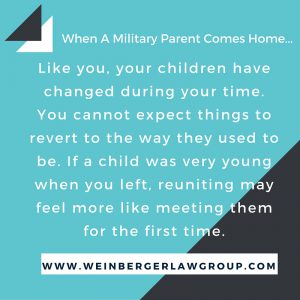Military Parenting Time: Top Tips For Reconnecting With Your Kids After Deployment
 Almost two million children in the United States have military parents and experience the strain that frequent and/or lengthy deployments place on families. It may come as a surprise, but in many cases, the stress doesn’t end after the parent returns home. While media images capturing service members’ exuberant post-deployment embraces with children can create a “fairy tale” image of reintegration, in reality, once the excitement of reunion dissipates, all family members (parents and kids) often realize that they have changed in each other’s absence. These changes include:
Almost two million children in the United States have military parents and experience the strain that frequent and/or lengthy deployments place on families. It may come as a surprise, but in many cases, the stress doesn’t end after the parent returns home. While media images capturing service members’ exuberant post-deployment embraces with children can create a “fairy tale” image of reintegration, in reality, once the excitement of reunion dissipates, all family members (parents and kids) often realize that they have changed in each other’s absence. These changes include:
– The at-home spouse may have grown accustomed to calling all the shots and may struggle to adapt to allow space for the military personnel’s role in the family.
– Military personnel who are used to crisis situations can experience a jarring shift to the mundane day-to-day pace of civilian life. A scene in the film Hurt Locker depicts this phenomenon. Jeremy Renner’s character, an adrenaline-junkie Special Forces officer responsible for disarming bombs in Iraq, is shown overwhelmed by the choice of cereals in the grocery store, and grows progressively more bored and disconnected from his wife and child.
– Mental Health Issues. Soldiers often return home with PTSD. Children can experience vicarious trauma when exposed to a parent’s mood swings, anger outbursts and panic attacks that seem to come out of nowhere.
– Children have gotten used to relying on the at-home parent and may not know if they can count on a parent they haven’t seen in months or years – or may not even remember.
Change is an inevitable part of life, but the conflict and disconnection that arises in many reunited military families does not need to be. Successful reintegrations are possible but they require work, especially in divorced military families where parenting time may be limited or contested. Here are some tips to help military personnel reconnect with their children.
Be Realistic. Like you, your children have changed during your time. You cannot expect things to revert to the way they used to be. If a child was very young when you left, reuniting may feel more like meeting them for the first time.
Be Patient. Reintegration is a process. According to The National Council On Family Relations, relationship stress may peak at 4-9 months post-deployment. Your children may not be as responsive or comfortable with you as soon as you would like. Rebuilding your relationship with them will take time and understanding.
Be An Active Co-Parent. Even in intact families, the spouse who stayed behind may struggle to be flexible after months or years of calling all the shots. In divorced families, transitioning from solo parenting to shared parenting is even more complicated. Military personnel must make an effort to communicate effectively (avoid putting the other parent on the defensive by using “I statements”), share child-rearing duties, and when possible, coordinate rules and expectations in both homes.
Don’t Take Children’s Reactions Personally. Because they aren’t used to having you around, your children may prefer being with the other parent, or may look to the other parent to meet their needs. Remember that this is not a rejection of you, but a normal process of a child’s readjustment to your re-entry into their life. If you appear wounded, your children may feel burdened by your emotions and distance themselves further. Take comfort in the fact that, no matter what they say or do, you are still their parent and they need you. Give them space to come back to you in their own time.
Educate Yourself About Children’s Developmental Stages. That sweet-natured third grader may have morphed into a temperamental tween since you’ve been gone. It’s important to educate yourself about children’s developmental stages: birth to age ten and tweens and teens.
Schedule Activities With Child. Make memories. Create rituals. The simplest activities are often the most meaningful: bedtime stories, weekend bike rides, making your kid’s favorite breakfast on Sundays.
Get Help For Mental Health Issues. If you are experiencing symptoms such as mood swings, panic attacks, sleep disturbances, anger outbursts, and substance abuse, you may be suffering from PTSD. Your emotional state impacts your children’s well-being, so it’s essential to get help. Treatment for mental health issues can be accessed from your local VA Center.
Alongside the emotional issues of reintegration, legal issues pertaining to child custody or child support can also arise, adding another layer of stress to an already complex time in life. For answers to your legal questions, including military divorce and military parenting time issues, please contact us to schedule your confidential consultation. Our family lawyers’ skill and experience with military family law cases enables us to create the right legal solutions for you and your family.


